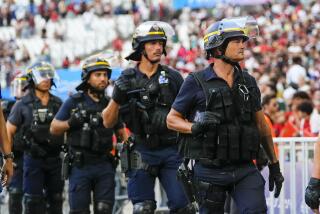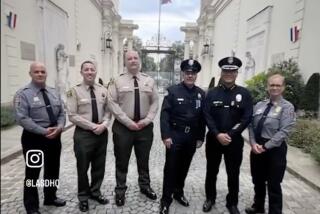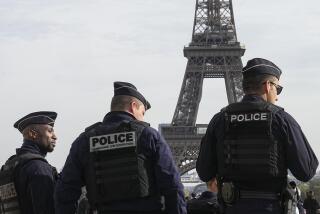Olympic Security Presents a Steep Challenge in Italy
- Share via
ROME — People like Ali Misbah are what make officials protecting this month’s Winter Olympics very nervous.
Misbah had a mini-arsenal in his apartment in Turin, the northern Italian city where the Olympics will open Friday, when he was arrested several years ago. And though the Egyptian-born militant fled Italy after serving his jail time -- and may have died carrying out a suicide bombing in Iraq -- he left behind a network of Islamic radicals that casts a shadow over efforts to hold a safe Winter Games.
Authorities say they have hundreds of potential troublemakers in Italy under surveillance ahead of the Games, which will conclude Feb. 26.
Although they know of no concrete threat, officials say, they consider the risk of an attack high from now through national elections in April.
Interior Minister Giuseppe Pisanu on Monday ordered security intensified even further in response to riots across the Muslim world that were prompted by caricatures of the prophet Muhammad appearing in European publications.
Pisanu convened an emergency meeting to assess whether the recent violence added to the threat at the Games, which are expected to draw 2,600 athletes and as many as 1 million spectators.
The caricatures that sparked Muslim outrage were cartoons printed in a Danish newspaper in September and reprinted recently in several European publications, including in Italy.
Before the riots, Italian authorities said they were most concerned about an attack similar to those carried out against public transportation systems in Madrid and London in the last two years.
The Italian government remains a fervent supporter of the U.S.-led war in Iraq, and Italy has been mentioned as a likely target on several radical Islamic websites.
“We remain reasonably worried,” said Gen. Mario Mori, director of Italy’s domestic intelligence service. “We cannot rule out the possibility that attacks like those in Madrid and London will take place here too in the future.”
There are plenty of groups to worry about, private security and law enforcement sources say.
“The list we have [of Italian and Islamic radical groups] is almost endless,” said Robert N. Sikellis, a security consultant who advised the 2004 Athens Summer Olympics organizing committee. “There are a lot of potentially dangerous scenarios coming together in these Games that we didn’t have in Athens and certainly not in Salt Lake City,” the site of the 2002 Winter Games.
Sikellis, managing director of Vance International, a U.S.-based risk management firm, said the recent wave of Muslim violence might prove a distraction, but the more serious threat would involve a plot already months in the making.
But Italy, Sikellis said, is “light-years” ahead of Greece in security measures, especially intelligence gathering.
Italian law enforcement officials say they have arrested 203 people in the last several years who were suspected of belonging to Islamic terrorism cells. The cells’ principal work was in providing logistical support to foreign groups or recruiting jihadists to be sent to other parts of Europe or Iraq. Nearly 30 suspects were deported, including the firebrand imam of Turin, authorities say. Two Algerians were deported Friday.
A suspected mastermind of the Madrid bombings, which killed nearly 200 people, is on trial in Milan, where he was arrested several months after the March 2004 attacks.
Italy is deploying more than 9,200 people from four police branches and mobilizing several thousand army troops to guard Olympic venues in and around Turin. Three hundred specialized soldiers, some with experience in Kosovo and Afghanistan, will use skis and snowmobiles to crisscross the Alpine slopes above Turin, where some of the more remote venues are located. One police unit will specialize in nuclear, chemical and biological threats, and all agents must be equipped and trained for working in high altitudes and low temperatures.
NATO aircraft will patrol the skies, help enforce a “no-fly” zone over Turin and monitor all venues. Missile batteries are being erected in strategic locations around the city, and a state-of-the-art digital radio system has been installed to improve communications, especially among police, fire and intelligence agencies.
Italy is also considering imposing tighter border controls to restrict entry from neighboring countries.
Far more important than boots on the ground is intelligence, and Italian law enforcement has a long history of closely monitoring radical groups. Its most important cases against Islamic cells have been built largely on wiretaps and similar surveillance.
Pisanu and national police chief Giovanni De Gennaro recently told senior U.S. officials that about 3% of Italy’s Muslim immigrant community was being “aggressively monitored.” As many as 2,000 people were under surveillance, along with Muslim schools, mosques, bakeries and butcher shops, according to an official familiar with Pisanu’s briefing.
Pisanu and De Gennaro also expressed concern that terrorists could focus on less secure targets in other cities, according to the official familiar with the meeting. The Italian officials said 13,000 potential targets nationwide had been identified for enhanced protection, the source said.
Local political and labor turmoil also threatens to disrupt the Games. Protesters against a high-speed rail line in the Susa Valley north of Turin, a venue for several events, tried to extinguish the Olympic torch as runners carried it toward Turin on Sunday, forcing a detour. Other demonstrators have assaulted a torchbearer and stolen the torch.
Authorities are also concerned about violence from “anarchists” and anti-globalization protesters like those who disrupted the Group of 8 economic summit in Genoa in 2001.
Far-left radical groups in Italy such as the Red Brigades that were active in the 1970s and ‘80s have been virtually eliminated, and authorities say there is no evidence of any connection between their remnants and newer Islamic groups. However, Pisanu said in a recent speech that he could not rule out the possibility that “foreign terror groups” could take advantage of any havoc created by domestic protesters.
Spending on security at the Athens Games broke all records and helped saddle Greece with a huge budget deficit. The most recent Winter Games, in Salt Lake City, occurred just months after the Sept. 11 attacks, and security spending there soared to $310 million.
Italian officials say they have spent about $110 million so far on security and expect the price to grow. An additional $12 million directed at public transportation was added to the budget after the bombings in London last summer.
In 2004, Greece came under pressure from countries that didn’t trust its ability to protect the athletes; Athens ultimately agreed to allow a NATO ground force to join Greek forces. So far, the Italians say they will handle all security, but they will allow foreign agents to be armed if they are assigned to the protection of foreign VIPs. Also, the Italians are consulting with Interpol, the FBI and other foreign law enforcement and intelligence services.
Francesco Tagliente, the Interior Ministry’s chief of public order, who is overseeing Olympic security, said delegations from the U.S. and Israel would receive special attention, as is customary, because they are considered more likely targets. The Israeli delegation this year will consist of only three athletes -- a skier and a pair of ice dancers; Israel sent 36 athletes to Athens.
The Games in Greece went off with minimal trouble, and there was no significant violence.
Italians often come in for criticism for rivalry among myriad law enforcement agencies. They say they have corrected some of that by uniting Olympic protection under a single coordinating office, and they cite their success in handling the funeral of Pope John Paul II last April, when 2 million pilgrims and 182 heads of state and government and other dignitaries converged on Rome.
“They did well with [the] pope’s funeral,” said Sikellis, the security consultant.
But he added: “This is the pope’s funeral for a month. They’ve never been tested on this scale.”
More to Read
Sign up for Essential California
The most important California stories and recommendations in your inbox every morning.
You may occasionally receive promotional content from the Los Angeles Times.














